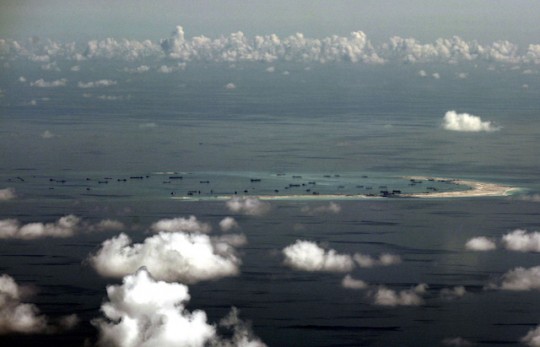Well over a week ago it was leaked to the press that the White House had approved, in principle, of the Navy conducting so-called "Freedom of Navigation Operations"—FONOPS—within 12 nautical miles of the artificial islands China has been building in the South China Sea. The New York Times reported that any such operation had been delayed to avoid disrupting Xi Jinping's visit to Washington. The Wall Street Journal said that a "U.S. official" claimed "that the operation could come within days."
Well, it's been days. Days are about to turn into weeks. And, as Jeff Smith points out in a very good round-up of the whole crisis thus far, "What the White House has failed to appreciate throughout this drama is the longer it talks about FONOPS without actually conducting them, the more volatile the situation becomes, and the more pressure China’s leadership feels to publicly adopt ever more strident and entrenched opposition."
The South China Sea is scene to competing territorial claims by Vietnam, Philippines, Malaysia, Brunei, Taiwan, and the People's Republic of China itself. China's claim, organized around its "Nine-Dash Line," is by far the most aggressive, turning a vast portion of the Pacific that happens to be a vital transit route for international trade into, effectively, a Chinese lake. China's justifications for its claim are risible. This is pure power politics, and if observed, the Nine Dash Line would result in the other nations' vessels finding themselves in Chinese-controlled waters soon after pushing off from their own shores, despite being potentially more than a thousand miles from China's coast. China's island building efforts on disputed, previously submerged reefs are clearly intended to give its claims teeth.
The Navy has reportedly been suggesting Freedom of Navigation Operations for some time now, but it was revealed last month that the Obama administration had blocked any U.S. ships from sailing within twelve miles of the artificial islands since 2012. As ever, our inaction has set a terrible precedent, putting China in a position where it can claim that the U.S. Navy exercising its right of navigation in international waters is a provocative violation of a peaceful status quo. (In case we weren't paying attention to the fact that they want to be taken seriously, last month Chinese naval vessels sailed within twelve miles of the Aleutian Islands, for the first time, while President Obama was visiting Alaska.) The fact that government officials are now talking big in the pages of U.S. newspapers while the Navy still hasn't done anything only makes the situation worse, and makes it harder for China to back down. The whole point of the operation is that such transit is a routine exercise of a right acknowledged under international law.
Our lack of initiative and timidity has increased tensions and put our interests, our allies' interests, and the principle of the freedom of navigation in a perilous spot. I am sure that those who are behind the delay feel that there are important tasks that must be accomplished—getting allies on board, for example. But this situation has only gotten worse with the passage of time. That's not going to change now.
